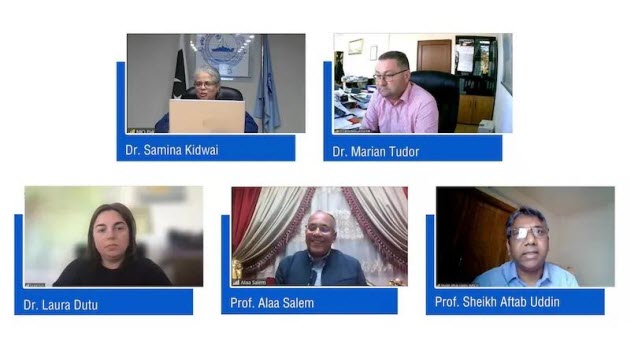The Kick-off Meeting for the International Joint Laboratory on Estuaries and Coasts (IJLEC), which is led by the State Key Laboratory of Estuarine and Coastal Research (SKLEC),was held online on January 19, 2022. More than 40 scientists and government officials from five countries attended this meeting.
Ms. HE Shangyan, Director of the International Cooperation Department from the Science and Technology Commission of Shanghai Municipality(STCSM), congratulated for the establishment of International Joint Laboratory on Estuaries and Coasts. She said Shanghai is now striving to build into a Global Innovation Hub. The joint laboratory led by SKLEC is an excellent platform for promoting scientific innovation and collaboration. She believes new achievements will be made in the field of estuarine and coastal research with the joint efforts from all the partners.
Culture, Science & Education Department from the Embassy of the People's Republic of China in Romania, expressed his congratulations for the launch of the joint laboratory. It is a concrete action made to implement the Belt and Road Science and Technology Innovation Action Plan, he said. The science section of China Embassy in Romania will provide strong support and assistance for the cooperation between China and Romania Scientists.
Prof. HE Qing, Director of the State Key Laboratory of Estuarine and Coastal Research, East China Normal University, and PI of the IJLEC warmly welcomed all the participants and briefly introduced the aims and scopes of the International Joint Laboratory on Estuaries and Coasts.
Representatives from Science and Technology Commission of Shanghai Municipality and the China Embassy in Romania delivered speeches respectively. And PI of the joint laboratory introduced the project
Dr. Samina Kidwai, Director General of the National Institute of Oceanography, Pakistan, Dr. Marian Tudor, Director of the Danube Delta National Institute for Research & Development, Romania, Dr. Laura Dutu from the Romanian National Institute of Marine Geology and Geoecology, Prof. Alaa Salem from Kafrelsheikh University, Egypt, and Prof. Sheikh Aftab Uddin from the Institute of Marine Science, Chittagong University, Bangladesh, presented the challenges and research needs in their deltas. They showed strong willing to work together on flooding prevention and early warning, coastal erosion, wetlands conservation and restoration, pollution control, saltwater intrusion and marine micro-plastics etc.
Partner representatives of the International Joint Laboratory on Estuaries and Coasts
The participants further discussed about the next steps for promoting the joint laboratory. We will set up different thematic research groups, organize workshops or training courses for students, and share remotely sensed data. The partner institutions will not only support for joint research, but also contribute to capacity building and technology transfer. The successful convening of this kick-off meeting marks the official launch of the International Joint Laboratory on Estuaries and Coasts, which has laid a good foundation for follow-up cooperation.
The group photo of the Kick-off Meeting for the International Joint Laboratory on Estuaries and Coasts
Introduction about the International Joint Laboratory of Estuaries and Coasts (IJLEC), Shanghai:
Estuaries and coasts are the key and vulnerable areas for the economic growth of the Maritime Silk Road countries and regions. Under the effect of climate change and human activities, the coastal zones all over the world are faced with multiple challenges such as storm surges, flooding, coastal erosion, degradation of ecological environment and damage to public health, which urgently need scientific and technological support. This Joint Lab is marked as the priority project of Mega-Delta programme, the latter being endorsed by the UN Decade of Ocean Science for Sustainable Development in June, 2021. Based on the research achievements and international cooperation basis of the State Key Laboratory of Estuarine and Coastal Research, we try to establish an international joint laboratory with the leading institutions from Pakistan, Bangladesh, Egypt, Romania and other countries. The cooperation is carried out through international academic cooperation, scientific and technological personnel exchange, students training and resources sharing. To improve the scientific research and innovation ability of cooperative partners. The joint laboratory will become a platform for information exchange and sharing among partner institutions, and serve the needs of partner countries for disaster prevention and mitigation, environmental protection and public health.








